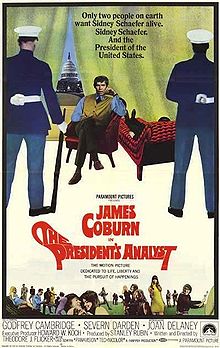
THE PRESIDENT'S ANALYST
US, 1967, 100 minutes, Colour.
James Coburn, Joan Delaney Godfrey Cambridge, Severn Darden, Will Geer.
Directed by Theodore J. Flicker.
The President's Analyst is quite a clever and funny satire on the United States, its people, institutions and politics. It was hardly noticed when first released. James Coburn plays himself as the man chosen to receive the burdens of the President's psyche. From privilege it becomes psychosis and nervous breakdown, giving the opportunity for a picaresque satirical adventure with a typical American family, a group of hippy musicians, spies, a Canadian yacht and a parody of Harry Palmer's torture in The Ipcress File, where our analyst becomes a victim of the Telephone Company's plot to take over in the United States. Dialogue is witty and there is plenty of visual humour and comic situations, especially those involving spies and two mythical organisations, the G.E.A. and the F.B.R. (the latter a puritanical, rule-bound squad of 5 foot high humourless agents).
Writer-director Theodore J. Flicker pokes fun at most aspects of the American way of life and doing things (and also at the Russians). It is a laughter-filled poking-fun, although many of the issues are deadly serious, Flicker wrote and directed Up in the Cellar (1969), a sleazy campus story which nevertheless had in its plot and in incidentals some of the funniest satire on the American university and revolution scene.
The President's Analyst is excellent American satire.
1. List the main targets of satire in the film. What (whom) were attacked most effectively? How?
2. Was psychoanalysis made fun of? Was it ridiculed unfairly?
3. How did the two strands of action shown during the credits (the analyses and the spies and murder) set the mood for the film and combine effectively at the opening of the film?
4. How good a psychiatrist was Dr. Schaeffer? Why was he picked to be the president's analyst? How did the interview with the older psychiatrist in the art gallery show this?
5. What was the difference between the C,E.A. and the F.B.R? Why were each satirised? What do you think the writer-director thought of the F.B.I.?
6. What aspects of American patriotism were laughed at in the White House scenes?
7. Why did Dr. Schaeffer become paranoid after the sessions with the President? Was there a serious point behind this?
8. How much of a caricature was the 'typical American family' prejudice, pride, violence?
9. Why did the film make the Russian and American spies so friendly?
10. Were the hippies and their music, drugs, love and sex presented seriously or were they being laughed at?
11. Why was the sequence with the Russian spy on board the yacht with all the jokes at Russia's expense so long? Was it to 'even out' the satire against the Americans?
12. Were you satisfied with the Telephone company finale with its mad plot to control America and its automatons? What was the point of it?
13. How did Dr Schaeffer change when he 'joined the club’ and started shooting to kill? Why did he enjoy it?
14. Was the finale - automatons watching the main characters - a good ending? What did it mean?
15. Comment on the effectiveness of individual scenes as good satire -e.g. the psychoanalysis story of the spy learning that he was a nigger, the luck of spies "being really able to kill to vent hostilities”, Schaeffer’s New York walk and the Statue of Liberty, the spies murdering one another.